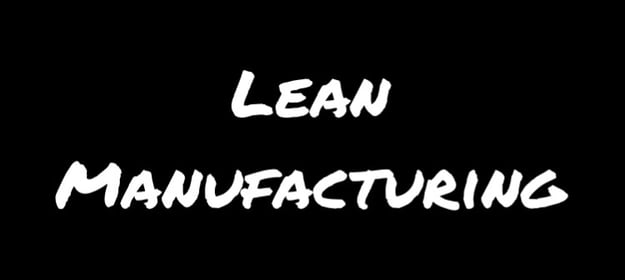Eliminating waste from the manufacturing process is quite challenging, but it is not impossible. Many project managers within production facilities experience the same struggles, but have found lean manufacturing to be a viable option.  With lean, it is a manufacturing method that locates areas of production that are not considered valuable to the consumer and eliminates it. This is how you can slowly enable your manufacturing operation to only produce what is absolutely essential, ultimately ridding the factory of any unnecessary production.
With lean, it is a manufacturing method that locates areas of production that are not considered valuable to the consumer and eliminates it. This is how you can slowly enable your manufacturing operation to only produce what is absolutely essential, ultimately ridding the factory of any unnecessary production.
5 Lean Manufacturing Principles
For lean to be effective, there are a few principles and concepts that the method follows. These are the following principles of lean manufacturing:
- Value Identification - Identifying what customers value is the most important aspect of lean manufacturing. Defining value can be anything that the consumer finds to be absolutely essential, which can help identify the areas that consumers find to be invaluable.
- Value Stream Mapping - Once value is determined, then it is time to turn to value stream mapping (VSM). This process includes identifying every aspect of the process, from the very beginning where raw materials are assembled to delivering the product. This principle helps with finding the other steps that are producing waste, ultimately enabling the operation to develop a plan to eliminate it.
- Creating Flow - Once the plan is enacted to eliminate the waste, the next step is overseeing the remaining steps within the operation. This is to ensure that there are no bottlenecks, interruptions, or any other issue within the process.
- Establishing a Pull - After the kinks within the process are figured out, production flow becomes much more faster and efficient. This is due to the elimination of the invaluable steps. This makes it much easier for consumers to “pull” products from you whenever needed.
- Seeking Perfection - Incorporating these steps alone will greatly improve your production facility, but lean manufacturing requires substantial effort and a change in mindset. Instead of looking at it as just a manufacturing method, it is important to view it as a culture, requiring everyone to be on board. Taking your process through the lean methodology several times can help your production facility come closer to reaching full potential.
Along with lean principles, it is important to be aware of common waste within manufacturing operations.
7 Waste of Lean Manufacturing
- Motion - Any unnecessary movements from machines are considered wasteful. This form of waste can also harm the equipment or product.
- Inventory - Excessive inventory leads to increased holding cost, ultimately costing your facility revenue. Establishing a production flow that meets customer needs when expected is much more beneficial to your supply chain and saves you from excessive inventory.
- Defects - Any error within a product will usually be sent back and cost you consumers and money. Keeping a close eye on your production and products can help avoid this issue.

- Overproduction - This correlates with high inventory, which also causes another string of issues. Even though overproduction seems like it can save you in the future, it is actually hurting you in the long run. Therefore, only try to meet customer requirements when they are needed.
- Transportation - Any form of transportation within the supply that is non-beneficial is considered wasteful. This adds up with time and waste productivity, which is why eliminating unnecessary steps through value stream mapping is a must.
- Overprocessing - Overprocessing only puts more work in than the consumer values. Therefore, only include the amount of processing that is considered absolutely necessary.
- Waiting - Wait time is one of the biggest forms of waste for manufacturing operations. Any time where production is halted, it is costing your facility revenue. Eliminating this waste can allow your operation to become much more efficient by saving you time and money.
Advanced Planning and Scheduling Software (APS) with Lean Manufacturing
Advanced planning and scheduling software (APS) is able to be integrated with lean manufacturing operations. APS software can aid in elimination of waste and take your production process to the next level. Some of the benefits of APS include the following:
- Improved Delivery Performance
- Boosts in Profit
- Reductions in Inventory
- Six Month ROI
APS has become top choice for many manufacturing facilities that wish to improve production. For more information on the functions of APS software, click here!
Related Lean Manufacturing Video
Key takeaways from this video:
- How PlanetTogether APS helps apply lean principles (value, flow, pull, perfection) in scheduling
- How APS reduces the 7 wastes—motion, inventory, defects, overproduction, transportation, overprocessing, and waiting
- How capacity-aware scheduling supports flow and pull instead of push production
- How what-if scenarios help test lean improvements safely before changing the live schedule
- How APS turns lean manufacturing from a one-time project into an ongoing, data-driven improvement process
Make Sure Your Lean Efforts Show Up in the Schedule
Identifying value, mapping the value stream, and teaching the 7 wastes are powerful lean steps—but if your production plan still lives in spreadsheets or rough-cut ERP logic, waste sneaks back in through day-to-day scheduling decisions. To truly eliminate waste and create flow, lean thinking has to be embedded in how you plan and schedule every shift.
Download our one-page “The Money Is in the Planning” infographic to see how better planning and scheduling can:
- Cut waiting, overproduction, and excess inventory across your value stream
- Reduce transportation, motion, and overprocessing by sequencing work more intelligently
- Improve delivery performance while using fewer resources
- Turn your existing ERP data and APS into a lean, demand-driven schedule instead of a push system
Use it as a quick checklist in lean events, VSM workshops, and planning meetings to connect lean manufacturing principles to the planning and scheduling changes that actually remove waste from your factory.
